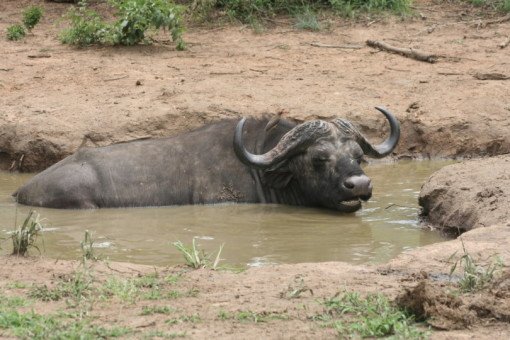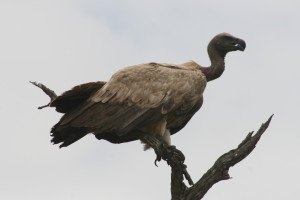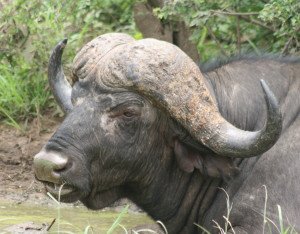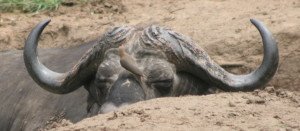Kruger National Park – Malelane & Berg-en-Dal 0

African Buffalo, with Redbilled Oxpeckers, resting up in one of the puddles left by the first rains of summer
The drought situation in Kruger National Park in 2016 reached such drastic proportions that it was one of the driest years in recorded history in some areas of the south, but blessed rains eventually fell in early December.
So when I nipped into the park for a morning’s birding on December 5, big puddles of water were still visible from the first rains of the summer. I figured the availability of this surface water would prove attractive to animals and so it proved.
The S114 is the first gravel road on the right after entering through Malelane Gate, and it runs along the Crocodile River before heading northwards towards Skukuza. Shortly before this, close to the S25 turnoff, there were large puddles of water formed next to the road in this area of mixed woodland and thorn thickets on granite, and next to them, half-a-dozen African Wild Dog were lounging around under some bushes.
I found two Buffalo lying in a mud-puddle on the side of the road as well and they were clearly not keen to leave, even though I was parked right next to them, clicking away happily on my camera.
Sadly, the rains came too late for many animals and, also on the S114 close to the Crocodile River, a Hippopotamus carcass was lying under a tree, in which one of those rather confusing African Fish Eagle juveniles was perched.
A juvenile Fish Eagle, whose hunting skills have not been fully honed, is quite likely to eat carrion, especially in a dry spell when their preferred food is scarce, but whether or not this individual had been gnawing on some Hippo, I have no way of knowing.
A Whitebacked Vulture was nearby in a tree, another portent of death.
A Hamerkop flew over the H3 tar road as one approaches the bridge over the Crocodile River, in which there was still water, the river being classified as a perennial, with the usual array of birdlife along its course. A solitary African Openbill, a couple of Glossy Ibis, which are considered rare in Kruger Park, only erratic visitors, and Yellowbilled Stork were with all the other common waterbirds, along with Great White Egret and Water Dikkop.
The S110 road turns left from Malelane Gate and heads north-west towards the Berg-en-Dal camp, running between some of the highest hills in Kruger Park, the differences in altitude meaning a great diversity of plants, which attracts a host of birds.
Southern Whitecrowned Shrike were buzzing between the bushes and a few Monotonous Lark were calling in the valley below the slopes of Khandzalive Hill, which is the highest point in the park at 840 metres.
There were a couple of White Rhinoceros with calves, a very pleasing sight, and, close to Berg-en-Dal Dam, a Monotonous Lark was perched on some low branches and scrub and rather scratchily giving its for syrup is sweet call.
Even the reptiles were out and about, with the impressive Blacklined Plated Lizard crossing the road.
Sightings list
Egyptian Goose
African Openbill
Sacred Ibis
Grey Heron
Cattle Egret
Yellowbilled Stork
Glossy Ibis
Southern Whitecrowned Shrike
African Elephant
Blackeyed Bulbul
Southern Black Flycatcher
Impala
Greater Kudu
Whitewinged Widow
Glossy Starling
Wiretailed Swallow
Monotonous Lark
African Buffalo
Redbilled Oxpecker
Forktailed Drongo
Lilacbreasted Roller
Cape Turtle Dove
White Rhinoceros
Little Swift
Brown Snake Eagle
Laughing Dove
Plains Zebra
Sabota Lark
Southern Yellowbilled Hornbill
Spotted Flycatcher
European Bee-Eater
Woodland Kingfisher
Blacklined Plated Lizard
Yellowfronted Canary
Arrowmarked Babbler
Blackcollared Barbet
Plumcoloured Starling
Redbilled Hornbill
Jacobin Cuckoo
Helmeted Guineafowl
African Hoopoe
African Wild Dog
Grey Lourie
Longtailed Shrike
Whitebacked Vulture
Giraffe
Grey Hornbill
African Fish Eagle
Hamerkop
Slender Mongoose
Great White Egret
Hadeda Ibis
Blacksmith Plover
Pied Kingfisher
Whitebreasted Cormorant
Water Dikkop


![IMG_1999[1]](http://kenborland.com/wp-content/uploads/2017/07/IMG_19991-e1500983479482-300x261.jpg)

